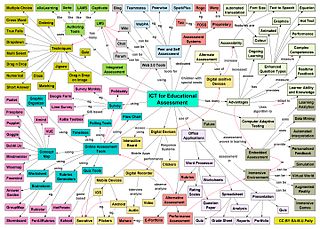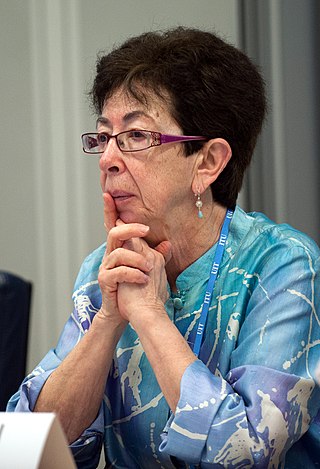Related Research Articles
The digital divide is the unequal access to digital technology, including smartphones, tablets, laptops, and the internet. The digital divide creates a division and inequality around access to information and resources. In the Information Age in which information and communication technologies (ICTs) have eclipsed manufacturing technologies as the basis for world economies and social connectivity, people without access to the Internet and other ICTs are at a socio-economic disadvantage, for they are unable or less able to find and apply for jobs, shop and learn.
The global digital divide describes global disparities, primarily between developed and developing countries, in regards to access to computing and information resources such as the Internet and the opportunities derived from such access.

Information and communications technology (ICT) is an extensional term for information technology (IT) that stresses the role of unified communications and the integration of telecommunications and computers, as well as necessary enterprise software, middleware, storage and audiovisual, that enable users to access, store, transmit, understand and manipulate information.

Nancy Jane Hafkin is a pioneer of networking and development information and electronic communications in Africa, spurring the Pan African Development Information System (PADIS) of the United Nations Economic Commission for Africa (UNECA) from 1987 until 1997. She also played a role in facilitating the Association for Progressive Communications's work to enable email connectivity in more than 10 countries during the early 1990s, before full Internet connectivity became a reality in most of Africa.

The mass media in Ethiopia consist of radio, television and the Internet, which remain under the control of the Ethiopian government, as well as private newspapers and magazines. Ten radio broadcast stations, eight AM and two shortwave, are licensed to operate in Ethiopia. The major radio broadcasting stations include Radio Fana a private station, Radio Voice of One Free Ethiopia, and the Voice of the Revolution of Tigray. The only terrestrial (broadcast) television networks are government owned and include EBC and other regional stations. In keeping with government policy, radio broadcasts occur in a variety of languages including Amharic, Afaan Oromo, Tigrigna, and more. There are also many video sharing websites which are a popular way of getting information as well as entertainment in Ethiopia.
The knowledge divide is the gap between those who can find, create, manage, process, and disseminate information or knowledge, and those who are impaired in this process. According to a 2005 UNESCO World Report, the rise in the 21st century of a global information society has resulted in the emergence of knowledge as a valuable resource, increasingly determining who has access to power and profit. The rapid dissemination of information on a potentially global scale as a result of new information media and the globally uneven ability to assimilate knowledge and information has resulted in potentially expanding gaps in knowledge between individuals and nations. The digital divide is an extension of the knowledge divide, dividing people who have access to the internet and those who do not. The knowledge divide also represents the inequalities of knowledge among different identities, including but not limited to race, economic status, and gender.
Over the past decade, there has been an increase in the use of information and communications technologies (ICTs) in China. As the largest developing country in the world, China faces a severe digital divide, which exists not only between mainland China and the developed countries, but also among its own regions and social groups.
Computer technology for developing areas is a field focused on using technology to improve the quality of life and support economic development in regions with limited access to resources and infrastructure. This area of research seeks to address the digital divide, which refers to the gap between those who have access to technology and those who do not, and the resulting inequalities in education, healthcare, and economic opportunities.
The digital divide in the United States refers to inequalities between individuals, households, and other groups of different demographic and socioeconomic levels in access to information and communication technologies ("ICTs") and in the knowledge and skills needed to effectively use the information gained from connecting.
Digital labor or digital labour represents an emergent form of labor characterized by the production of value through interaction with information and communication technologies such as digital platforms or artificial intelligence. Examples of digital labor include on-demand platforms, micro-working, and user-generated data for digital platforms such as social media. Digital labor describes work that encompasses a variety of online tasks. If a country has the structure to maintain a digital economy, digital labor can generate income for individuals without the limitations of physical barriers.

The digital divide in Canada refers to the discrepancy that exists between Canadians who have access to information and communication technologies (ICT) and the benefits they provide compared to those who do not. This divide can be the result of many factors, including high costs for technology and online access, differences in the availability of online connectivity resources in different locations across the country, and lacking digital literacy. The digital divide in Canada also stems from income inequality among Canadians and differences in online practices exhibited by those of different age, gender, first language, and cultural background.

The digital divide is a term used to describe the disadvantage in access to information which people without access to ICT suffer. Nigeria's digital divide refers to the inequality of Nigerian individuals, groups, or organizations with regard to access to Information and communications technology (ICT) infrastructure or to the internet for daily activities. The digital divide has been attributed to many factors among which is the high cost of computer equipment, lack of ICT skill and poor knowledge of available search engines. Lack of access to ICT makes it difficult for people to access information. The benefits of having access to ICT are numerous. ICT has the potential to promote other sectors of the economy such as agriculture, education, health, bank, defence etc. In times of emergency, ICT becomes an indispensable tool for overcoming the barriers of time and distance. Education, lack of electrical infrastructure, income, urban drift, and a variety of other social and political factors contribute to Nigeria's growing digital divide.

The digital divide in Germany, the second most populous state and leading economic powerhouse in Europe, refers to the ever-growing gap between members of society without computer or Internet access and those with access. There are several factors contributing to the digital divide in Germany, including age, gender, family structure, education, ethnicity, and motivation. With a large market of Information and Communications Technology (ICT) in Germany, there are still areas that don't have access to high-speed internet. Internet access in Germany is more available in big cities compared to rural communities. The German government has taken initiative to increase internet access through the rural communities by adding free internet access throughout the communities, as well as, increase internet education in schools.
The digital divide in Malaysia refers to the gap between people who have access to certain technologies within the country of Malaysia. The presence of the digital divide is due to several factors that include age, location, and wealth, all of which can contribute to the gap in availability of information communication technology (ICT). Malaysia is not a fully developed country, which has led some researchers to express concern that the limited access to ICT may cause the country to fall even further behind in the progress of worldwide technology if this issue is not addressed and mended.

The digital divide is an economic and social inequality with regard to access to, use of, or impact of information and communication technologies (ICT). Factors causing the divide can vary depending on the country and culture, as can the potential solutions for minimizing or closing the divide.

The digital divide in Thailand refers to the economic, educational, and social inequalities between the Thai people who have access to information and communications technology (ICT) and those who do not. Thailand is a developing country within Southeast Asia, and is currently confronted with this problem. There are a number of factors that determine the digital divide within a country, including income, choice of technologies and socioeconomic factors. ICT development and mobile penetration are strongly correlated with economic growth and social benefits.
Digital inclusion involves the activities necessary to ensure equitable access to and use of information and communication technologies for participation in social and economic life including for education, social services, health, social and community participation. Digital inclusion includes access to affordable broadband Internet services, Internet-enabled devices, access to digital literacy training, quality technical support, and applications and online content designed to enable and encourage self-sufficiency, participation, and collaboration. Related concepts include digital divide, digital exclusion and digital inequality however digital inclusion focuses more on the strategies, policies and programs required to address the digital divide.
Gender digital divide is defined as gender biases coded into technology products, technology sector and digital skills education.

The digital divide in Colombia refers to inequalities between individuals, households, and other groups of different demographic and socioeconomic levels. More specifically, differences in access to information and communication technologies ("ICTs") and in the knowledge and skills needed to effectively use the information gained from connecting.
The African Internet Governance Forum (AfIGF) is a multistakeholder forum that facilitates dialogue on Internet governance issues. It is one of the 19 regional IGF initiatives and aims to address and discuss the issues of all 54 nations in Africa.
References
- ↑ Norris, P. 2001. Digital divide: Civic engagement, information poverty and the Internet world- wide. Cambridge, MA: Cambridge Univ. Press.
- ↑ "FALLING THROUGH THE NET: A Survey of the "Have Nots" in Rural and Urban America". doc.gov.
- ↑ Patricia, J.P. 2003. 'E-government, E-Asean Task force, UNDP-APDIP'(PDF)
- ↑ Mossberger, K., C.J. Tolbert, and M. Stansbury. 2003. Virtual inequality: Beyond the digital divide. Washington, DC: Georgetown University Press.
- ↑ "The World Factbook — Central Intelligence Agency". www.cia.gov. Archived from the original on June 13, 2007. Retrieved 2017-10-29.
- ↑ "Ethiopia blocks internet during exams". BBC News. 2017-06-01. Retrieved 2017-10-24.
- 1 2 Hare, Harry (June 2007). "ICT in Education in Ethiopia" (PDF). World Bank. Retrieved 14 March 2018.
- ↑ "Gender Digital Divide Persists in Africa". cipesa.org. Retrieved 2017-10-29.
- ↑ Geldof, Marije (Winter 2011). "Earphones Are Not for Women: Gendered ICT Use Among Youths in Ethiopia and Malawi" . Retrieved October 10, 2017.
- 1 2 "Bridging the Digital Gender Divide in Africa" (PDF). Retrieved October 10, 2017.
- ↑ SciDev.Net. "Ethiopia gets connected". SciDev.Net. Retrieved 2017-11-12.
- ↑ "Closing Digital Divide Critical to Social, Economic Development, Delegates Say at Second Committee Debate on Information and Communications Technologies | Meetings Coverage and Press Releases". www.un.org. Retrieved 2017-11-12.